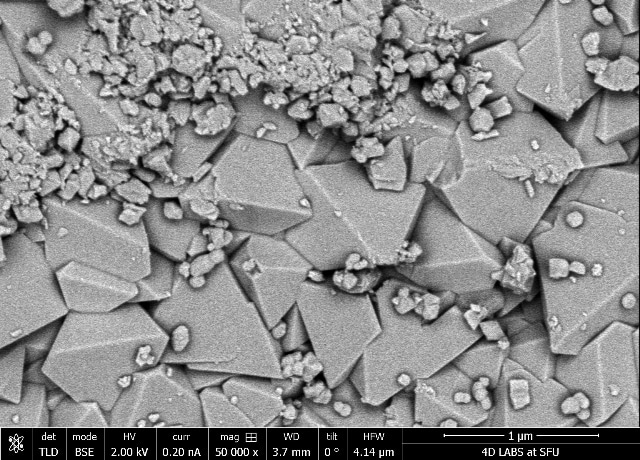Apr 1 2016
Dan Blondal, CEO of Nano One Materials Corp. announced today that Nano One has successfully produced high-voltage cobalt-free lithium ion battery cathode materials. Testing shows that this Nano One material has advantages over commercial equivalents.
 Scanning electron micrograph (50,000 times magnification) of Nano One’s high voltage cobalt-free cathode material showing desirable octahedral crystal structure.
Scanning electron micrograph (50,000 times magnification) of Nano One’s high voltage cobalt-free cathode material showing desirable octahedral crystal structure.
“Our patented process has produced material that shows better longevity with over 10 times less energy fade,” said Mr. Blondal, “and we’ve measured up to 50% more energy at high rates of discharge. This material is remarkably stable and could be very competitive with existing commercial materials in terms of its high voltage performance and its cobalt free cost advantages.”
“Cobalt adds cost and supply chain risk to most lithium ion batteries,” says veteran mining entrepreneur and Nano One Chairman Paul Matysek. “The most recent battery material being produced by Nano One requires only lithium, manganese, nickel and no cobalt. This should be well received by the battery industry as it reduces costs, environmental footprint and the supply chain risks while providing high voltage advantages for next generation lithium ion batteries.”
The material, known as high voltage spinel, has cost advantages because it contains no cobalt and has 4.7-volt potential, which is 30%-45% higher voltage than commercial cells found in hand-held devices and electric vehicle batteries. High voltage materials like these are expected to play a significant role in future automotive and grid storage battery applications. Nano One anticipates that this material will be of interest to strategic industry players.
“While results are preliminary for this high voltage spinel and there is much to learn, we are encouraged by its advantageous crystal structure and by its performance in batteries,” explains Nano One Principal Scientist Dr. Stephen Campbell. “Results show more stability and conductivity than commercially available materials which could pack more cathode material into a cell, extend longevity and improve safety. Add to that its higher voltage and this material could increase energy and power densities of batteries, reduce the number of battery cells and lower requirements for thermal and charge management. All of these benefits could drive down weight, volume, and cost of battery packs.”
In parallel with these activities, Nano One is developing its processing technology for the industrial production of a wide range of lithium ion battery cathode materials including cutting edge and next generation variations on nickel, manganese, cobalt and iron based lithium ion batteries. Nano One is confident that its process technology can be commercialized and has initiated the design and construction of a pilot scale plant to demonstrate the scaled-up production of multiple cathode materials for lithium ion batteries.